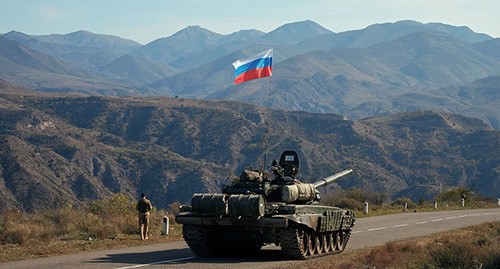
13 November 2020, 08:45
Advent of Russian peacemakers into Karabakh outlines threat to Georgia
The Armenian-Azerbaijani reconciliation is economically beneficial for Georgia, but the increase of the Russian military presence in Southern Caucasus could negatively affect the regional security, the Tbilisi political analysts, interviewed by the "Caucasian Knot", believe.
The "Caucasian Knot" has reported that Russian peacemakers have already taken control of the Lachin corridor connecting Karabakh with the territory of Armenia, having set up temporary posts there.
On November 10, an agreement between Russia, Azerbaijan, and Armenia on the cessation of the hostilities in Nagorno-Karabakh came into force. According to the reached agreement, the Russian peacemakers are deployed along the contact line in Nagorno-Karabakh and along the corridor connecting it with Armenia.
According to Kakha Gogolashvili, a researcher at the Rondeli Centre for Strategic and International Studies of the Caucasus, the main threat to Georgia is that Russia is gaining leverages over Azerbaijan and Armenia, and can now demand from these countries to worsen their relations with Georgia.
Mr Gogolashvili believes that Georgia should strive to ensure that Azerbaijan and Armenia sign an agreement on the status of Nagorno-Karabakh as soon as possible, so that the three republics become a sort of "Caucasian Benelux". However, according to the expert, Russia will not admit this. "It will be extremely unprofitable for Russia, because Russian peacemakers will not be needed there; and the military base in Gyumri will not be needed. Russia will lose its leverages on both Armenia and Azerbaijan. Therefore, it will oppose reconciliation," Kakha Gogolashvili is sure.
In his opinion, in Nagorno-Karabakh Russia uses the same strategy as in South Ossetia from 1992 to 2008. "The ceasefire regime without a political settlement reminds me very much of the same regime that was in the Tskhinvali region – when half of the territory was under the control of the de facto authorities; and there were peacemakers on the other part. This went on and on, and ended in nothing good, as we see. That is, Russia is gradually coming to the model that was in South Ossetia and Abkhazia," Kakha Gogolashvili has concluded.
This article was originally published on the Russian page of 24/7 Internet agency ‘Caucasian Knot’ on November 12, 2020 at 08:44 pm MSK. To access the full text of the article, click here.
Author: Beslan Kmuzov Source: CK correspondent




